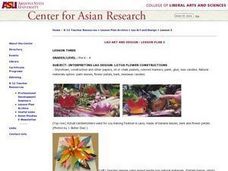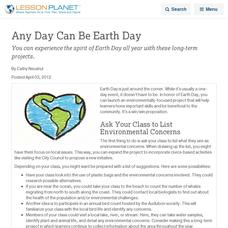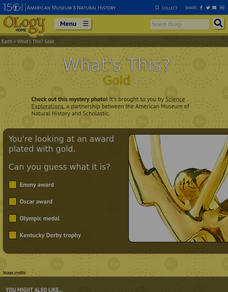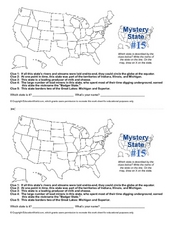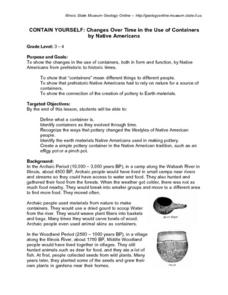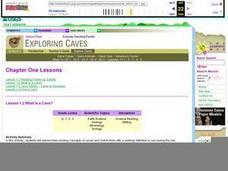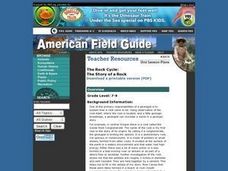Curated OER
Discovering the Oasis
Students focus on the types of vegetation and animal life living around local water sources. This lesson plan can be adapted to any local water source, whether it be a lake, a river, stream or ocean. It has a particular focus on the...
Curated OER
The Chesapeake Bay in Captain John Smith's Time
When Captain John Smith visited the Chesapeake Bay in the summer of 1608, what types of animals and habitats did he encounter? Your young historians will analyze primary source documents to answer this question, as well as compare...
California Academy of Science
Pollution in Our Watershed
The concept of a how pesticides and other chemicals pass through a watershed can be difficult for younger learners to grasp without a concrete example. In the activity here, some blank paper, markers, and a spray bottle are all you need...
Curated OER
What's In A Name? British Surnames Derived from Places
Students study how British surnames were derived from locations. They observe that some of the more common names are still prevalent today.
National Energy Education Development Project
Exploring Hydropower
In 2006, about 20 percent of the world's electricity was generated from hydroelectric power. In the presentation, scholars review the water cycle and gravitational energy to begin to understand how humans harness the power of water. They...
Curated OER
Lao Design: Lotus Flower Constructions
Students create lotus flowers in 3-D designs applying Lao art techniques. Following a teacher demonstration, they assemble their own lotus flower candleholders and the teacher arranges a group flotation in a body of water. Students...
Curated OER
Any Day Can Be Earth Day
You can make the spirit of Earth Day last year round with these long-term projects.
K12 Reader
Water Cycle
solid, liquid, and gas. The three different forms of water are the subject of the article used to assess reading comprehension. After reading the article, kids respond to a series of comprehension questions based on the text.
Indian Land Tenure Foundation
Respect for Land
Youngsters examine how people show respect and care for the land. Specifically, learners see how the Native Americans truly did care for and respect the land, and still do so to this day! They also explore how they themselves can care...
University of Wisconsin
Sizing a Rain Garden
Most appropriate if you are applying the entire unit to build a rain garden at your school, this installment involves calculating the area that will drain into it. Your garden planners will need data from previous lessons, so this one...
Curated OER
Unit 2: Global to Local: Understanding My Place in the Hydrosphere
What does the ground around your home have to do with water pollution? Young ecologists learn about their local watershed and create their own cause-and-effect models of the hydrosphere.
Curated OER
Unit 3: Scientific Writing
Write-on! Demonstrate a writing model and support learners as they write an informational essay on a water resource issue of your (or their) choosing. The lesson plan provides a well-scaffolded summative writing...
Hands On Network
Passion into Action
Find your passion. Find service opportunities. Decide how to serve. An instructional packet offers step-by-step directions for getting involved in community service. The practical suggestions and helpful worksheets make what may...
American Museum of Natural History
What's This? Gold
Cell phones are likely made of gold—at least part of them! An interesting lesson explains the conventional and not-so-conventional uses of the popular element gold. From the Inca empire to modern-day technology, learners discover gold...
Curated OER
Determination of Water Hardness
Students investigate water hardness. In this water hardness lesson plan, students determine the water hardness in 4 samples of water after buffering each. By using titration and an indicator, students can determine the amount of calcium...
Curated OER
Mystery State #15
Do you know the name of the Badger State? Using five fantastic clues, your super sleuths will determine the name of mystery state number 15. A wonderful way to warm up the class!
Environmental Protection Agency (EPA)
Teachers' Guide to Using A Day In the Life of a Drop
Hydrology hopefuls learn about their local watershed. Through discussion and online interactives, they see that their habits affect the water supply. The lesson concludes with a pledge to filter out bad water usage habits. It makes a...
Foundation for Water & Energy Education
Perpetual Flow Activity
Set up a demonstration of how gravity can drive the perpetual flow of water during your hydro power unit. Science learners work in teams to make observations and formulate questions about how it works. They compare the model to what they...
Curated OER
Contain Yourself: Changes Over Time in the Use of Containers by Native Americans
Students investigate how Native American containers changed over time and how the use of pottery changed their lifestyle. They create a pottery container.
Curated OER
A Tale of Two Wetlands
Students observe 2 separate wetlands (following downloadable worksheets) and record 10 similarities and 10 differences between them. Then they present their recommendations to the class who roleplay the government's wetland conservation...
Curated OER
What Is A Cave?
Students explore their existing concepts of caves and match them with a working definition to use during the unit. They name the two types of rock formations in which most American caves occur, and define "show cave" and "wild cave."
Curated OER
The Rock Cycle: The Story of a Rock
Students describe the changes undergone by rocks during the rock cycle and develop an understanding of the interconnectedness of the rock cycle.
Curated OER
Hunt the Fact Monster Hunt #34
In this Internet research activity, students use the Fact Monster search engine to find the answers to ten unrelated questions. Three of the questions are multiple choice, the remaining seven are short answer questions.
Curated OER
Winter Olympics Vocabulary
In this Winter Olympics vocabulary skills worksheet, students match the 12 Olympics-related terms in the word bank to the appropriate definitions.
Other popular searches
- Streams and Rivers
- Create Rivers and Streams
- Rivers and Streams Fl
- Rivers and Streams Lab
- Rivers and Streams Biomes
- Streams Rivers
- Rivers and Streams Bio Mes







